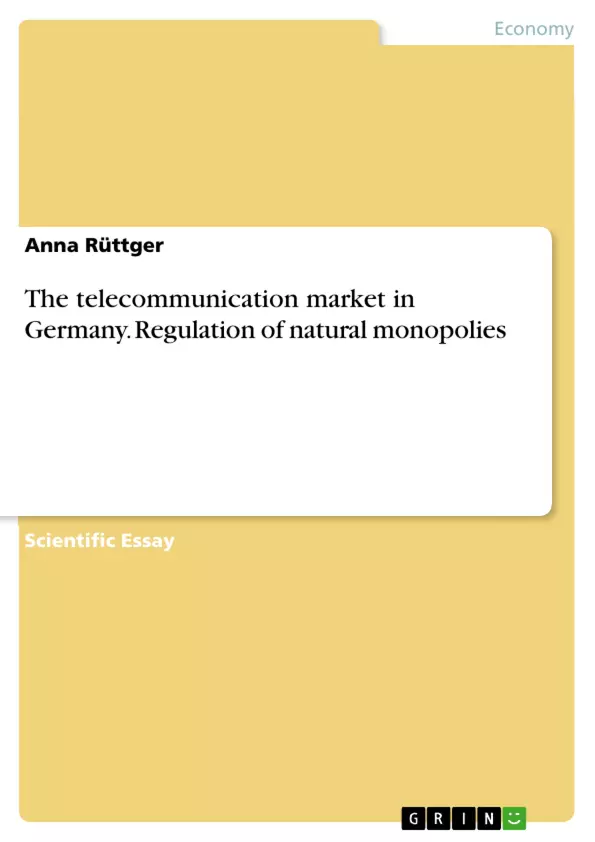This paper deals with the regulation of natural monopolies by the government. In general, regulation pursues the goal to guarantee equal opportunities within a market and to sustainably encourage competitive markets to the advantage of the consumer by affecting the conduct of the monopolist. A natural monopoly arises when a single firm is able to supply a good or service to an entire market at a lower cost than two or more firms. This failure of competition is the result of a specific market, in which variety of suppliers causes a decline of market output. For example this could happen when there are extremely high fixed costs, such as large-scale infrastructure needed to ensure supply (like cables and conductions regarding the telecommunications sector) and it is more efficient to only allow one firm to supply to the market. Allowing other firms entering the market would mean they had to duplicate all the fixed costs, which in turn states that competition would lead to inefficient duplication of resources. Usually, government intervention is necessary within natural monopolies, because in that case the existence of a monopoly is beneficial and efficient or even unavoidable, but negative effects, which could be a result of the position, need to be avoided.
In a first step, this paper will refer to these negative effects, which can arise from a naturally monopolistic situation and lead to economic issues. Hence, you can conclude why natural monopolies need to get regulated. Subsequently, this paper will outline methods how to regulate a market, but due to the fact that there are many different opportunities, this paper will only refer to a few examples to give a small insight. In a final step, the paper will give an example of a current regulation system in Germany. In this case the regulation system will be the telecommunications sector. On the basis of this sector, it will be demonstrated if its regulation was successful and how the government tried to regulate the market.
Inhaltsverzeichnis (Table of Contents)
- 1 Introduction
- 2 Why Regulate Natural Monopolies?
- 3 Methods of Government Regulation
- 4 Example of a current Regulation System in Germany – The Telecommunications Sector
- 4.1 Development of the Telecommunications Sector due to Regulation
- 4.2 How did the Government Regulate the Market?
- 5 Conclusion
- 6 Bibliography
Zielsetzung und Themenschwerpunkte (Objectives and Key Themes)
This seminar paper examines the regulation of natural monopolies by the government. The primary objective is to explore the reasons why regulation is necessary to ensure fair competition and protect consumers from potential negative effects associated with monopolies. The paper will also delve into various methods of regulation, illustrating them with real-world examples.
- Economic issues arising from unregulated natural monopolies
- Methods of government regulation, including competition promotion, conduct rules, and public ownership
- The role of regulatory commissions in overseeing monopolies
- The impact of regulation on market development, illustrated through the telecommunications sector in Germany
- The importance of balancing consumer welfare with the need for efficient market operations
Zusammenfassung der Kapitel (Chapter Summaries)
The introduction provides a general overview of the topic of natural monopolies and their regulation. It highlights the potential for economic issues arising from unregulated monopolies, such as higher prices and reduced innovation. Chapter 2 delves deeper into the reasons why regulating natural monopolies is crucial, focusing on the negative effects of allocative inefficiency and x-inefficiency. Chapter 3 explores various methods of government regulation, including promoting competition, imposing conduct rules, and converting private monopolies into public entities. The paper then examines the telecommunications sector in Germany as a case study of regulation, analyzing the sector's development and the government's regulatory measures.
Schlüsselwörter (Keywords)
The paper centers around the core concepts of natural monopolies, government regulation, market efficiency, consumer welfare, and competitive markets. It examines regulatory methods such as competition promotion, conduct rules, and rate-of-return regulation. The telecommunications sector in Germany provides a practical example of regulation and its impact on market development.
Frequently Asked Questions
What is a natural monopoly?
A natural monopoly occurs when a single firm can supply a service to an entire market at a lower cost than multiple firms could, often due to high fixed costs like large-scale infrastructure.
Why does the government regulate natural monopolies?
Regulation is necessary to prevent the negative effects of a monopoly, such as excessively high prices, lack of innovation, and inefficient resource allocation, ensuring fair market conditions for consumers.
How was the telecommunications market in Germany regulated?
The German government used various measures, including promoting competition and setting conduct rules, to break up former state-owned monopolies and encourage new providers to enter the market.
What is "x-inefficiency" in a monopoly?
It refers to the lack of incentive for a monopolist to keep costs low or innovate because they face no competition, leading to higher operational costs than necessary.
What are the common methods of government regulation?
Common methods include rate-of-return regulation, price caps, imposing service quality standards, and in some cases, public ownership of the utility.
Was the regulation of the German telecommunications sector successful?
The paper demonstrates that regulation led to increased competition, lower prices for consumers, and a broader variety of services, though challenges in infrastructure development remain.
- Quote paper
- Anna Rüttger (Author), 2015, The telecommunication market in Germany. Regulation of natural monopolies, Munich, GRIN Verlag, https://www.grin.com/document/319782



